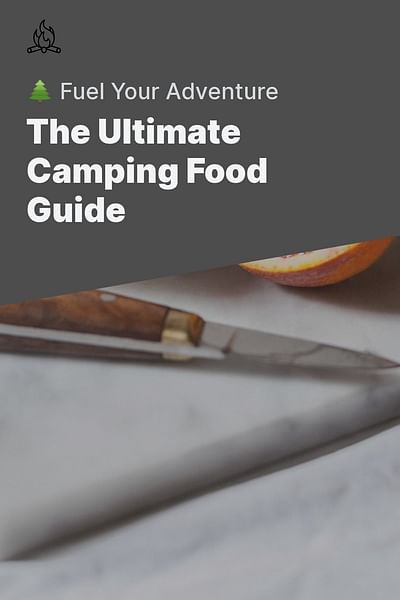Brian is a seasoned culinary expert and food enthusiast with a special knack for whipping up nutritious and delectable meals for outdoor adventurers. He upholds the belief that good food is the cornerstone of a remarkable camping experience and takes delight in imparting his culinary knowledge and tips to others.
When planning for a three-night camping trip, it's important to pack food that is not only delicious but also provides the energy and nutrients you need to fuel your outdoor adventures. Here are some tips and ideas for selecting the best food for your camping trip:
1. Plan your meals: Before heading out, take some time to plan your meals for each day of your camping trip. This will help you ensure that you have all the necessary ingredients and avoid any last-minute stress. Consider including a mix of easy-to-make meals and some special treats to make your camping experience even more enjoyable. You can refer to our comprehensive guide to healthy camping meals for some balanced and tasty meal ideas.
2. Pack non-perishable foods: Since you'll be camping for three nights, it's best to pack non-perishable foods that won't spoil easily. This includes items like canned beans, dried fruits, nuts, granola bars, and jerky. These foods are lightweight, easy to pack, and provide a good source of energy. Learn more about essential camping food preservation techniques to keep your meals fresh.
3. Choose high-energy foods: When you're out hiking and exploring, you'll need foods that provide sustained energy. Opt for foods that are high in protein, healthy fats, and complex carbohydrates. Some great options include trail mix, nut butter, whole grain bread or crackers, and energy bars. These foods will keep you feeling full and energized throughout your camping trip. Check out our article on the best energy foods for hiking for more ideas.
4. Consider your dietary preferences: If you have specific dietary preferences or restrictions, it's important to plan your meals accordingly. For vegetarians and vegans, pack plant-based protein sources like tofu, lentils, and quinoa. You can also try some of our top 10 vegetarian camping recipes for a healthy and delicious outdoor experience. If you're gluten-free, look for gluten-free bread, pasta, and snacks. For more gluten-free meal ideas, check out our article on 10 mouthwatering gluten-free camping meals. Don't forget to pack plenty of fruits and vegetables to ensure you're getting a good balance of nutrients.
5. Don't forget the essentials: In addition to your main meals, make sure to pack some essential items like cooking oil, spices, and condiments. These small additions can make a big difference in enhancing the flavor of your meals. Also, don't forget to bring plenty of water and stay hydrated throughout your camping trip.
6. Practice proper food storage: When camping, it's important to store your food properly, especially in bear country. Use bear-resistant containers or hang your food in a tree away from your campsite. This will help prevent bears and other wildlife from being attracted to your food. Additionally, keep perishable items in a cooler with ice packs to maintain their freshness. For more tips on food storage in bear country, read our key camping nutrition tips.
7. Enjoy some one-pot meals: One-pot meals are a great option for camping as they require minimal cleanup and can be easily prepared over a campfire or portable stove. Consider making dishes like chili, stir-fry, or pasta with vegetables. These meals are not only delicious but also provide a good balance of nutrients. For more one-pot meal ideas, check out our article on fast, healthy, and environmentally-friendly one-pot vegan camping meals.
Remember, the key to a successful camping trip is to pack food that is not only nutritious but also enjoyable to eat. By planning your meals, choosing high-energy foods, and practicing proper food storage, you'll be well-prepared to have a fantastic camping experience. Happy camping!















